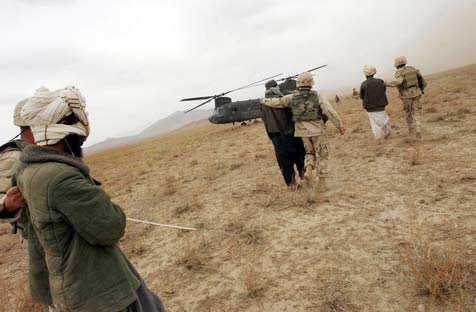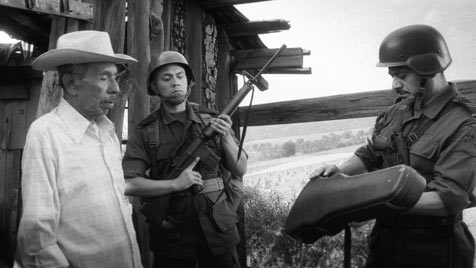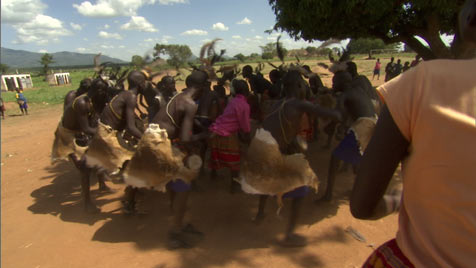UCSB’s 3rd Annual Human Rights Film Festival
Films for Those Who Care

Of all the cultural coups masterminded by UCSB Arts and Lectures in recent years, none is as globally relevant and thoughtfully progressive as the Human Rights Film Festival, a three-day slate of international films that focus on social justice issues around the world. The third annual installment-featuring a nourishing blend of drama, documentary, and animation-runs next Tuesday, Wednesday, and Thursday, May 27-29, with two films per night starting at 7 and 9 p.m. Compared to the filmic shotgun blasts of past years, the 2008 festival seems organized to appeal to a distinct film fan on each day, so that’s how this preview is laid out.

Tuesday, May 27: For the Classics Lover
One joy of international cinema is that films from foreign lands often reflect the classical style of old Hollywood, an era when mood, conversation, and cinematography were more important than big bang and bigger bucks. This truth is reflected wholeheartedly in both 4 Months, 3 Weeks and 2 Days, from Romania, and The Violin, from Mexico.
4 Months takes the viewer back to Romania in 1987, when the crash of communism was imminent, yet life still adhered to the authoritarian nightmares of constant ID checks, blackmarket buying, and clandestine tasks. The fictional narrative follows two female college students-the slower, feeble one needs an abortion but leaves the bulk of the arranging up to her stronger, smarter dorm mate, who’s in the throes of her own relationship problems. Offering a slice-of-life look at the final days of the Eastern Bloc, it’s also the most contemplative film in the whole bunch, with plenty of long, silent takes, a sense of emotional growth, and enough unanswered questions to keep you thinking about it for days to come.
A similar sense of personal discovery is evident in the black-and-white drama The Violin. Set in an unnamed Latin American country during a time of revolutionary turmoil, it follows the plight of a simple farmer who provides weapons to a guerrilla movement while the government forces are occupying his land. The film, which is touted as the most internationally awarded film in Mexican history, features beautiful music from the star, Don Angel Tavira, who is a violinist from Guerrero in real life, and has a documentary-like feel, in part because it uses some nonprofessional actors. On display in this methodically paced movie are the brutal traditions of pillaging and execution employed by far too many Latin American dictatorships, and it leaves little wonder as to why the people of this land would want to fight for their freedom.
Wednesday, May 28: For the Wonks
This night brings revelatory meat to the festival, with two investigative documentaries dissecting the policies of Israel and the United States in their fight against terror in the Middle East and beyond. Both are award-winning-Taxi to the Dark Side picked up the 2008 Oscar for best doc, while Hot House got the special jury prize from Sundance the year before-so they’re even engaging for those who aren’t public policy experts. But be assured, progressive wonks will devour these selections.
Taxi to the Dark Side is the most thorough cinematic treatise on torture yet. It jumps into the sticky subject by using the case of an innocent Afghan taxi driver named Dilawar, who was swept up in the war against the Taliban and thrown into Bagram prison, where he died from injuries related to grotesque beatings. This happened before the atrocities at Abu Ghraib in Iraq and before the light started being shined at Guant¡namo Bay, so the filmmakers try to answer whether the interrogation policies of stress positions, attack dogs, and sensory assault were officially sanctioned by Donald Rumsfeld and Dick Cheney. Exhaustively researched and expansively interrogatory-interviews include high-level military men, convicted torturers, and one innocent British man who was held in Bagram and Gitmo for 15 months for no reason-this is a stunning look at Americans misbehaving during war. What’s unfortunately not stunning anymore, however, is that the untrained soldiers go to jail and the Pentagon puppeteers get promoted.
Incarceration policies of another sort are under scrutiny in Hot House, which goes inside Israel’s high security prisons to chat one-on-one with Palestine’s most notorious “terrorists.” The problem is that while some of these prisoners are indeed bad guys-young failed suicide bombers, female bomb specialists, clearly violent offenders-others are actually winning campaigns for political positions in the Palestinian Authority government. These are well-educated, brilliant minds, but because they fight for freedom, Israel sees them as terrorist threats. It’s as complicated a situation as geopolitics can offer, but this film will give further fuel to your political debates, no matter which side of the West Bank you support.

Thursday, May 29: For the Inspired
This is the night for all ages, for the hope-seekers, and for anyone who just wants to see a couple amazing flicks back-to-back. Both Persepolis (a hit worldwide) and War/Dance (a favorite at the Santa Barbara International Film Festival) could fill their own theaters on any given night of the week, so powerful, beautiful, and perfectly presented are their sagas.
Any of us wondering about the rise of Islamic fundamentalism, the role of the United States in messing up the Middle East, or the modern history of Iran get all the history and perspective we need in Persepolis, a gorgeously animated movie about a girl who comes of age during Iran’s Islamic Revolution. It opens in the Iranian 1970s, a time when life resembled Europeans’, people were free, and the West was embraced. With the young Marjani Satrapi’s family as our eyepiece, the film proceeds through the overthrow of the Shah, the rise of fundamentalists, the purging of revolutionaries, and the war against Iraq. Should she stay? Should she go? Should she return? But it’s not just those questions that arise, for Persepolis is also the story of a young girl, of her loves, her successes, and her failures. It’s a portrait of the true toll that revolution, war, and Western meddling can have on real people’s lives.

The festival ends on a high note with War/Dance, a lovingly rendered documentary about a dance troupe from the Patongo refugee camp in war-torn Northern Uganda that gets invited to compete in the national championships. The situation in Northern Uganda, where a cult-like band of rebels has been kidnapping children and making them into vicious soldiers for decades, has been told many times over by now, but this doc is the first to give it an element of hope for a better future. The singers and dancers-some were former child soldiers, many are orphans, all have seen death and fighting since birth-open their hearts to the filmmakers, and give thoughtful, honest accounts of their personal battles. The crisp, colorful cinematography-think landscapes of red dirt, green foliage, and sherbet-colored sunsets-is enough to get tourism started in the war zone, and the footage, including a chat between one dancer and a surrendered rebel about the boy’s missing brother, is heartbreaking. Yet against these troubles, the film finds inspiration in a land where hope seems to have disappeared long ago, making it the perfect finale to another fantastic Human Rights Film Festival.
4•1•1
The 3rd Annual Human Rights Film Festival takes over the screen at UCSB’s Campbell Hall, Tuesday-Thursday, May 27-29, with films at 7 and 9 p.m. each night. Call 893-3535 or see artsandlectures.ucsb.edu.



